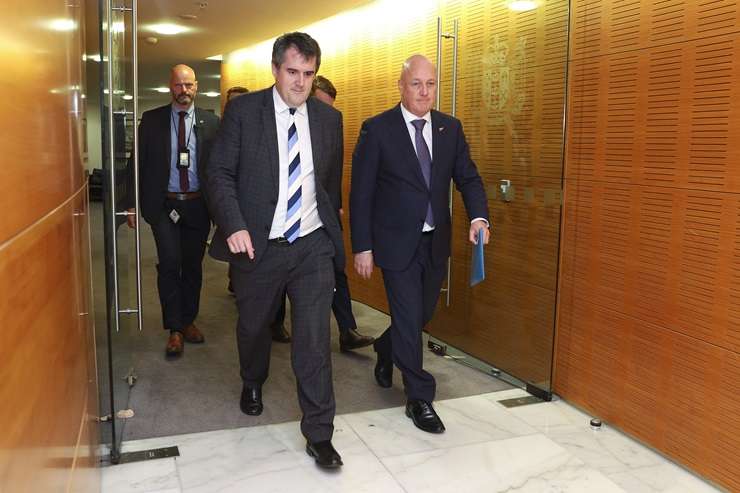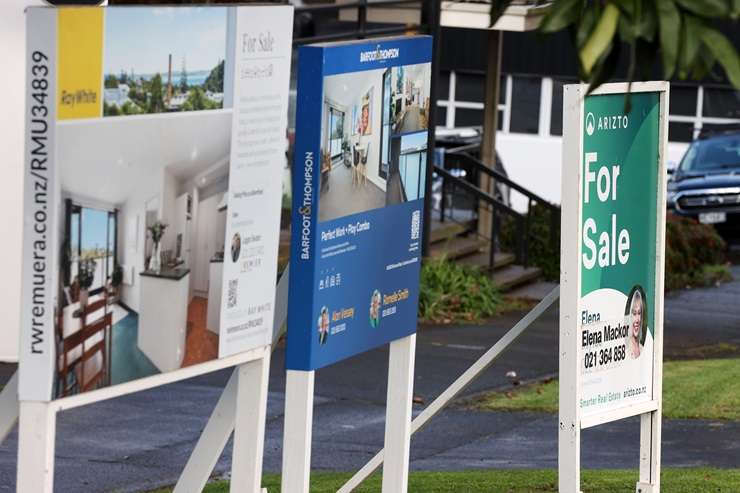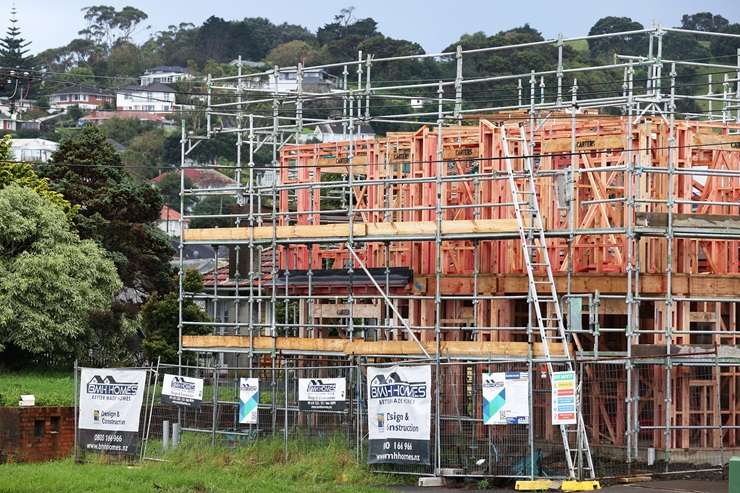The Government has announced it is scrapping the first home grant scheme, which provides financial assistance to first-home buyers.
However, some in the housing sector have told OneRoof that any scrapping of the few “crumbs” of government help available to first home buyers would be devastating.
Housing Minister Chris Bishop today said Kāinga Ora was no longer accepting new applications for first home grants, although it would still process applications that had already been received.
“The first home grant, which provides eligible first-home buyers with a median of $5000 towards a house deposit, is an expensive and inefficient way to support first-home buyers,” he said.
Start your property search
While the grant is being axed, Bishop said the Government is keeping the first home loan scheme, which allows first-home buyers who meet the criteria to buy a house with a deposit of only 5%.
Earlier this week, Bishop said the Government had “significant” concerns about the financial performance and governance of the Government housing agency. Kāinga Ora, the country’s biggest landlord, had assets of $45 billion and over $2.5bn of expenditure each year, owning more than 70,000 homes.
Discover more:
- Own outright in less than 6 years: Suburbs where Kiwis can pay off the mortgage fastest
- Middle-class nightmare: 'Unhealthy' debt, private school fees killing house upgrade dreams
- Countdown to bright-line: Stressed landlords urged to 'beat the rush' and list now
The announcement was in response to a review of the organisation by former Prime Minister Bill English which was part of the Coalition’s 100-day plan.
Among recommendations was addressing barriers “in order to increase provision of social housing by CHPs (community housing providers), iwi and Maori, and other providers”, leading to concerns of privatisation by stealth.
The first home grant scheme gives $5000 for an existing home and $10,000 for a new home to first-home buyers who meet the income thresholds of under $95,000 for a single person or $150,000 for a combined income.
Before Bishop’s announcement today, Alan Leuluai, senior advisor with Leuluai Financial in Manukau, in Auckland’s south, told OneRoof the first home grant and the first home loan schemes were crucial in getting some first-home buyers over the line.

Housing Minister Chris Bishop, left, and Prime Minister Christopher Luxon. Bishop this week announced a shake-up of Kāinga Ora and the scrapping of KiwiBuild. Photo / Getty Images
He said he had helped many families into their first home with the use of these measures and that was good for society.
Axing them would be devastating as most of his first-home buyer clients used their KiwiSaver for their deposit because most did not have a 20% deposit saved.
Most did qualify for the 5% loan and the grant. The larger grant for a new build was incentivised because buying a new home helped the economy.
“If you buy a brand-new house you’ve got the builder, carpenter, the tiler, the painter, the fencing, the carpet, so it goes on so that’s the reason they’ve given the incentives.”
The other big benefit of vital importance was the 5% loan scheme, without which some first-home buyers would have missed out on the dream of home ownership.
Leuluai said he had gotten about 40 first-home buyers over the line in the last couple of years through the schemes, and the benefits of a first home were many.

House prices in New Zealand houses dropped some 14% during the recent slump but they are still 36% above where they were five years ago. Photo / Fiona Goodall
“It’s security, it’s stability, it’s certainty. Not having to worry about landlords putting their rent up. They can have the freedom for themselves.”
Home ownership set people up for life: “The whole idea is to build and create wealth for yourself, that’s what a house does, because if you’re 60 and you’re about to retire and you’re still living in a rental property, I don’t know how you’re going to live to be honest.”
OneRoof also talked to Lesley Harris, of the First Home Buyers Club, before Bishop’s axing of the first home grant. She said overhauling Kāinga Ora in itself was not a bad thing, but first-home buyers needed more help, not less.
The overall problem was there was no government strategic plan around first-home buyers and the importance of home ownership overall.
“We just continue to see things being thrown at this, and I’ve talked about this for years,” she said.
“It’s not a co-ordinated, strategic approach. It’s just throw something at it and then that burns out and then let’s throw another thing at it.
“There’s kind of crumbs here and there. It’s very confusing for first-time buyers as to what you can get.”
There needed to be a First Home Buyer Minister appointed, and the real problems looked at.
Part of that was working with banks to get them to treat first-home buyers differently and to get first home products fit for purpose.
“It’s not just a government thing, it’s all the partners that support these things as well.”
The first home schemes were about more than the taxpayer dollar, she said.
Not being able to get into a first home could have far-reaching consequences 40 years later when someone was retired and homeless.
Her number one question to the Government would be whether it saw first-home buyers and homeownership as a key plank for the country.

Houses under construction in Wellington. Market commentators have highlighted a need for more homes. Photo / Getty Images
“Before we go off formulating and throwing in a whole lot more crumbs, is it a strategically important pillar? Yes or no. Because I don’t know that it is.”
She pointed out that the third biggest bank in the land for first-home buyers was “the bank of mum and dad” but questioned what that meant for mum and dad in their retirement.
Labour’s much criticised KiwiBuild initiative, which Bishop has signaled will end at some point, had been a flop because while a lot of houses were built, the lending crisis was not addressed so people could not get loans, she said.
There was no one solution: “You can’t look at it in isolation and throw a few crumbs at it.”
Others spoken to by OneRoof said over and above loans and grants for first-home buyers, the bigger issue was that the country needed more houses.
Kelvin Davidson, chief economist for CoreLogic, said whether or not new houses were delivered by the Government or the private sector was not the issue – the issue was “we need more houses for everybody”.

CoreLogic chief economist Kelvin Davidson says no one has really cracked housing supply. Photo / Peter Meecham
“Ultimately the bigger picture is we need more houses of all types, of all funding methods, and housing supply is an issue that’s been around for many decades through different governments and different sides of the spectrum and nobody has really cracked it.”
He agreed the grants and loan schemes were important to first-home buyers but access to KiwiSaver, access to low deposit finance at the banks and less competition from other buyer groups were also important.
Even if the first-home buyer schemes were left in place, first-home buyers still had to be able to service their loan and handle the interest rates.
The Government had a lot to weigh up with the economy not doing well, pressure around interest rates and households hurting.
“Right now it’s a pretty tough environment. We spent a lot during Covid and the Government books have deteriorated. I guess in this environment stuff needs to be prioritised.”

Kiwibank chief economist Jarrod Kerr says there is a "chronic shortage" of houses in New Zealand and "it's not being addressed". Photo / Fiona Goodall
Jarrod Kerr, Kiwibank’s chief economist, would not be drawn into the politics but stressed that the bigger issue was that more houses were needed, saying it did not matter how they were built but that they were built.
“We’ve got a chronic shortage. It’s not being addressed, I think, adequately enough across private and public.”
Holding back supply was the country’s inability to invest in infrastructure over recent decades and imaginative solutions were needed.
Kerr also acknowledged the Government had choices to make around money in the current economic climate, but said it was a myth the Government had too much debt.
“We have very low levels of debt, very low levels. Our net debt position is one of the strongest in the world, not just the developed world, in the world.
“Councils have too much debt, the Government doesn’t. I think they have the ability to take on more debt to do the various things they need to do, whether it’s infrastructure or building houses.”
- Click here to find properties for sale

















































































